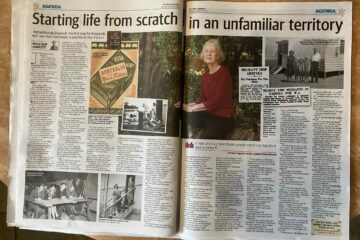This thesis was written by Anne Pauwels, a linguist and professor. The main focus of the thesis is to examine how mixed marriages between Dutch- speaking and English-speaking Australians impact on the use and maintenance of the Dutch language in Australia, within the family and the Dutch community. The project explores the language use practices in 120 Dutch-Australian families, comparing endogamous and exogamous families. The research methodology includes interviews, questionnaires, and observations. The results not only confirmed that marrying outside one’s language group accelerated language shift, but it also discovered that there is a gender factor, especially in the mixed marriage: Australian women married to Dutch men encourage them to maintain Dutch, even if they do not speak (much) Dutch themselves. The thesis serves as an important resource for scholars and researchers interested in language contact, bilingualism, and the sociolinguistics of immigrant communities.
The thesis is not available online. However, you can request access to it for private research and study by contacting your institution’s library service. Additionally, the thesis is held by the Koninklijke Bibliotheek Den Haag (Royal Library of The Hague) and can be located with the sign NL 94 H 4451.An article based on the thesis was published in 1985 The role of mixed marriages in language shift among Dutch in Australia. It can be accessed via the online of various Australian Universities.
Professor Anna Pauwels
Anne Pauwels was born in Belgium and obtained her first degree in Germanic Philology from the University of Antwerp.
In 1979 she moved to Australia and completed her MA and PhD at Monash University. The theses and her further research focused on language contact, multilingualism, language policy, cross-cultural communication. While she continued to focus on Dutch, she also expanded such work to other languages including German, Greek, Vietnamese.
In 1995 she moved from Monash University to take up the foundation chair in Linguistics at the University of New England, then to the University of Wollongong where she was Dean of the Faculty of Arts and Professor of Languages and Linguistics. In 2000 she moved to the University of Western Australia, again to be Dean of the Faculty and Professor of Linguistics. In 2008 she moved to the United Kingdom, first to the University of Birmingham and then to the University of London, School of Oriental and African Studies (SOAS) where she was Dean and Professor of Sociolinguistics until her retirement in 2020. She is now Emeritus Professor at SOAS and holds an Honorary Professorial Fellowship at the University of Melbourne.
She continues to research in her fields of expertise: social and sociolinguistic aspects of multilingualism, linguistic landscapes and soundscapes of multilingual cities, gender and language, and language policy in higher education.
Publications Anne Pauwels – Google Scholar
Prof. Anne Pauwels: Heritage and Community Languages in Higher Education, SOAS, University of London. Lecture from 2010
Since the late 1980s, Australia’s language situation has been guided by a comprehensive language policy with main principles including:
- English for all
- A second language for all
- The protection and maintenance of Australian Indigenous languages
- Language services for those who do not (yet) have English language competency
While the subsequent language policies have undergone changes in name, format, and emphasis, these four principles have been consistently maintained. Federal and state-based language education policies have primarily focused on providing English language education and community language education (also known as Languages other than English).
In most states in Australia, the learning of another language (second, community, foreign) in either primary, secondary, or both levels of education is part of the core curriculum. The range of languages offered is extensive, and final exams can be taken in over 40 languages. Recognising that students have varying levels of competency, efforts have been made to accommodate these differences. Schools are increasingly utilising different models of teaching community languages, such as bilingual classes and immersion programs, which are likely to enhance students’ proficiency levels.
While school-based language education in Australia continues to face challenges, it is relatively healthy compared to other English-language communities. However, the situation of community languages in universities presents more significant challenges. In this presentation, I will outline these challenges and report on a nationwide project developed to address the current issues concerning community languages in higher education.


